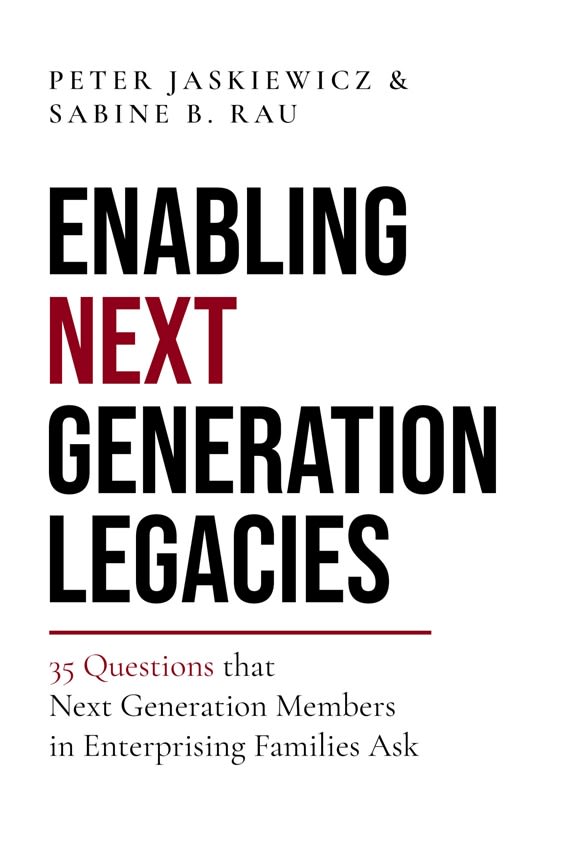À quel moment doit-on créer un bureau de gestion du patrimoine pour administrer la richesse familiale?

Résultat de nombreuses années de recherche et d’expérience pratique à l’échelle internationale, cet ouvrage s’intéresse aux défis particuliers auxquels font face les entreprises familiales.
Peter Jaskiewicz et Sabine Rau, membres du corps professoral de l’École de gestion Telfer, ont réuni des universitaires, des familles entrepreneuriales ainsi que des praticiennes et praticiens mondialement reconnus afin de répondre, de manière brève, concise et néanmoins pertinente, aux questions les plus pressantes auxquelles est confrontée la prochaine génération.
Fort de l’apport de quelque cent collaboratrices et collaborateurs issus de 27 pays, le livre présente les pratiques exemplaires, des exemples concrets ainsi que des questions essentielles visant à susciter la réflexion. Les commentaires d’experts proviennent de membres des entreprises familiales les plus importantes du monde, dont Auchan (France), Saputo (Canada), and Sabra (Israël), ainsi que de divers spécialistes universitaires travaillant dans des écoles de gestion renommées telles que Kellogg, IMD, et INSEAD.
Vous trouverez ci-dessous la réponse à une question pressante qui se pose aux entreprises familiales (dans sa version originale anglaise).
We have wealth. When should we set up a family office to organize it?
Response by Kirby Rosplock and Dianne H. B. Welsh, U.S.
Families who have goals to perpetuate, grow, or sustain significant family wealth over generations are often motivated to set up a single-family office (SFO). But first, what is a single-family office? A family office is simply a business designed to manage wealth and other business interests for one or multiple family members. Family office origins date back centuries, and a family enterprise is often at its inception.[i] It may provide various services such as tax, estate planning, accounting, investing, compliance, recordkeeping, IT, reporting, trust administration, financial planning, governance, and security.[ii] A family office's mandate is not fixed and often evolves—requiring updating and strategic planning.
The wealth creator(s) often set(s) up a family office, and subsequent generations monitor and maintain it. A study estimates that there are 7,300 family offices globally, managing $5.9 trillion collectively, with 42 percent (3,100) in North America alone.[iii] To justify the expense of operating a full-service SFO, most experts advise that a family should have a minimum of $250 million.[iv] Some may set up an office for less but typically set up a virtual family office and outsource to third parties. Family offices are an entrepreneurial endeavor and require a stewardship ethos in the family.[v] Many times, they are often an extension of a family enterprise.[vi] The following are four best practices when establishing and evolving a family office:
- Scope: Assess the family's current state, wealth, and answer: Is there enough wealth to justify the expense? Do we need to build it or buy family office services from providers? Do we have to buy-in and support from the family to set up the office? What services should be offered now or in the future
- Purpose: Understand the goals, mission, and vision of the family office by answering the questions: Why do we want a family office? What are its goals? What is its mission, values, and vision?
- Strategic plan: Craft a strategic plan for the family office. Devising both a business and a financial plan is critical to its success. Who will create and design the family office strategic plan? What services will the office perform? Which personnel are essential to be inside the family versus outsourced? What risk controls and measures will be taken for security, safekeeping, and protection of the family's assets and well-being? What is our contingency plan when/if certain things do not go as planned?
- Process: Build process for the ongoing oversight, maintenance, and management of the family office. How will we document how the office operates? How will we formalize family governance protocols? How will we monitor the performance of both family office employees as well as the management of our wealth?
The following case study illustrates the setup, management, and evolution of a noteworthy family office.
Mathile Case Study
From a single-family office's inception, strategic planning is a critical function. The Mathiles' story begins fifty years ago, in 1970, when Clay Mathile accepted a leadership role at Iams Food Company, then a small pet food manufacturer. He became its sole owner and CEO by 1982. By 1999, Iams commanded a 5.7 percent share of the U.S. pet food market and sold one hundred different products in seventy-five countries. Mathile then decided to sell the company to Procter & Gamble for $2.3 billion.
Operating company sales often trigger the setup of a family office. In the Mathiles' case, they created their family office in 1997 and did initial wealth planning. The first eighteen months after the sale was consumed with work that involved merely investing the sale proceeds. But then, the family office asked, "Who do we really want to be?" This sale signaled the start of outlining the vision and goals for the family office. They considered, what we wanted to do? Why were we there? Why did we exist? What were our services? The outcome was a full-service family office focused on the first generation.
Not long after creating the first strategic plan, the family office realized it was time to focus on two adult generations' needs and goals coming up the ranks. While encouraging the second-generation family members' voices, this strategic planning cycle improved family office efficiencies, risk management protocols, and scoping appropriate service levels to different generations. Currently, assets are dispersed across the generations, with half of the family's third-generation family members coming of age. The office now serves three generations with varying client services and needs. The fourth strategic planning cycle focused on developing a flexible wealth advisory platform, providing visibility about family office activities, and engaging the third generation.[vii]
Summary
Family offices are set up and operated, having different mandates and purposes. Recognizing they are entrepreneurial endeavors, it is essential to (1) evaluate the services and operations rendered, (2) clarify its purpose, (3) craft a family office strategic plan, and (4) and adhere to a process to administer the office. Some key family office takeaways from the Mathile's case include: (1) action, (2) alignment, (3) fluidity and order, and (4) knowing that involving outside experts and facilitators is required when starting and managing change in a family office. Strategic planning is continuous and informed by new information triggering the need to reassess and seek alignment. The twenty-year-old Mathiles' family office is exemplary in its efforts to support strategic planning as a method to embrace change.
In conclusion, pathways to a family office are all unique, as shared in The Complete Family Office Handbook,[viii] which provides expanded foundational reading. There is never a perfect time to start your family's office strategic planning. Identifying family office consultants during the inception, and the planning and evolution of a family office are keys to its ongoing success. More insights on family office setup and planning may be found in Setting Up a Family Office[ix] and Effective Family Office: Best Practices and Beyond.[x]
Kirby Rosplock is the founder/CEO of Tamarind Learning, a wealth education firm, and Tamarind Partners, a family office consultancy named 2019 Best Family Office Consultancy and Best Family Wealth Counseling by the Family Wealth Report. Kirby is ranked among the 100 Family Enterprise Influencers by Family Capital (2020). Kirby was honored with the Family Wealth Alliance’s Family Wealth Industry Thought Leadership award (2018) and FFI’s Richard Beckhard Practice award (2018). Kirby is dean of Family Office at PPI, and a Fellow/Faculty of FFI’s GEN Program. Kirby authored The Complete Family Office Handbook (first and second editions) and The Complete Direct Investing Handbook.
Dianne H. B. Welsh is the Hayes Distinguished Professor of Entrepreneurship and founding director of Entrepreneurship at the University of North Carolina Greensboro. Dianne has held three endowed chairs. A recognized scholar in family businesses, international entrepreneurship, women-owned businesses, and franchising, she is the author of seven books and over 150 publications. She is a Certified Family Business Advisor and fellow with the Family Firm Institute. She received the Barbara Hollander Award (lifelong contributions) from the Family Firm Institute and the Legacy Award (lifetime contributions) from the Global Consortium of Entrepreneurship Centers. Dianne is writing on the eighteenth-oldest family business in the world and serves on the Tamarind Learning Council.
[i] Kirby Rosplock and Dianne H.B. Welsh, “Sustaining Family Wealth: The Impact of the Family Office on the Family Enterprise,” in Understanding Family Businesses: Undiscovered Approaches, Unique Perspectives, and Neglected Topics, eds. Alan L. Carsrud and Malin Brännback (New York: Springer, 2012), 289-312.
[ii] Kirby Rosplock, The Complete Family Office Handbook: A Guide for Affluent Families and the Advisors Who Serve Them (Hoboken: John Wiley & Sons, 2021), 1-480.
[iii] James Beech, “Global Family Office Growth Soars, Manages $5.9 Trillion,” Campden FB, July 18, 2019. Retrieved from https://www.campdenfb.com/article/global-family-office-growth-soars-manages-59-trillion.
[iv] Kirby Rosplock, The Complete Family Office Handbook: A Guide for Affluent Families and the Advisors Who Serve Them (Hoboken: John Wiley & Sons, 2021), 1-480.
[v] Dianne H.B. Welsh, Esra Memili, Kirby Rosplock, Juan Roure and Juan Luis Segurado, “Perceptions of entrepreneurship across generations in family offices: A stewardship theory perspective,” Journal of Family Business Strategy 4, no.3 (September 2013): 213-226.
[vi] Juan Roure, Juan Luis Segurado, Dianne H.B. Welsh and Kirby Rosplock, “Toward a Conceptual Model of the Role of Entrepreneurship in the Family Office,” The Journal of Applied Management and Entrepreneurship 18, no.4 (October 2013): 42.
[vii] Kirby Rosplock, The Complete Family Office Handbook: A Guide for Affluent Families and the Advisors Who Serve Them (Hoboken: John Wiley & Sons, 2021), 1-480.
[viii] Ibid.
[ix] Barbara R. Hauser and Keith Drewery, Setting Up a Family Office (London: Global Law and Business, 2020): 1-80.
[x] Angelo Robles, Effective Family Office: Best Practices and Beyond (Greenwich: Family Office Press, 2017): 1-114.
L’ouvrage intitulé «Next Generation Legacies» est maintenant disponible en copie numrique et physique. Toutes les redevances de sont versées au Fonds Telfer de l'Université d'Ottawa, qui aide les étudiantes et étudiants dans le besoin. Visitez le site www.35questions.com pour plus de détails.
Pour en savoir davantage sur la façon dont Telfer alimente la discussion sur l’avenir de l’entrepreneuriat familial, visitez le site de l’Institut de l’héritage des entreprises familiales et abonnez-vous au bulletin d’information.
